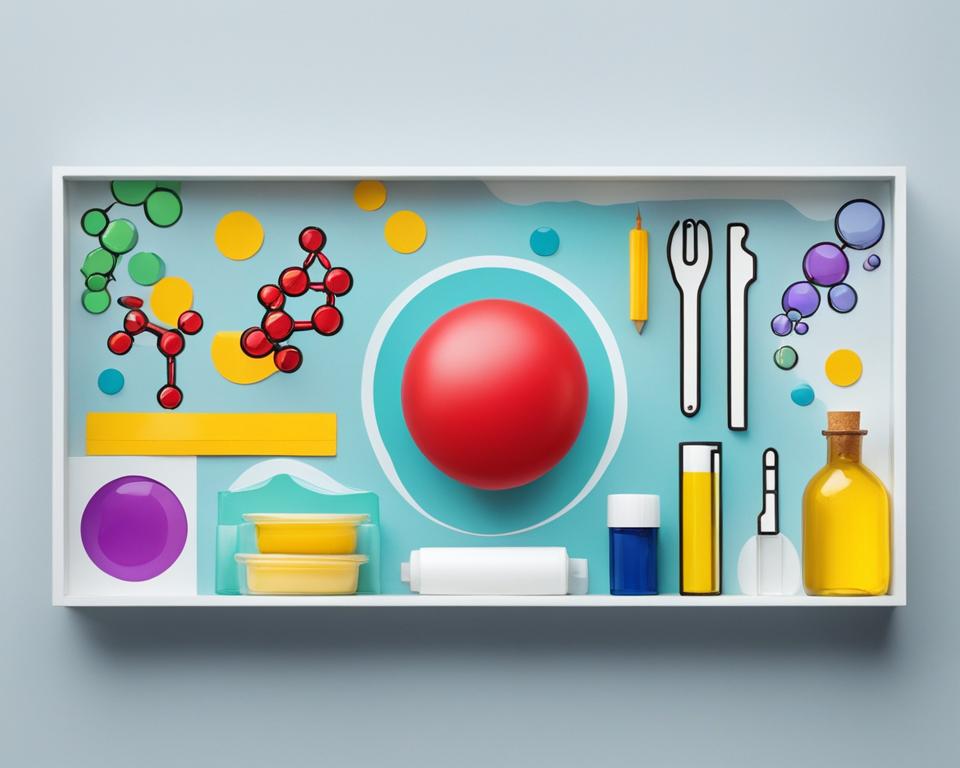Lipids, or fats, are often associated with negative connotations such as weight gain and unhealthy diets. However, lipids play crucial roles in our everyday lives, contributing to various aspects of our health and well-being.
In this article, we will delve into the diverse applications and benefits of lipids. From energy storage to brain function, lipids are essential to our physiological functioning.
Key Takeaways:
- Lipids serve as a crucial energy store and are broken down into fatty acids for energy production.
- Phospholipids, a type of lipid, are the primary components of cell membranes, contributing to cell structure and signaling.
- Cholesterol, a type of lipid, serves as a precursor for hormone synthesis.
- Lipids are vital for maintaining optimal brain function and have been associated with improved cognitive function.
- Fat-soluble vitamins require lipids for proper absorption and utilization in the body.
Lipids as Energy Storage
When it comes to energy storage, lipids play a critical role in our bodies. Triglycerides, a type of lipid, act as a reservoir for energy storage. They are primarily stored in adipose tissue, but they are also present in other organs throughout the body. 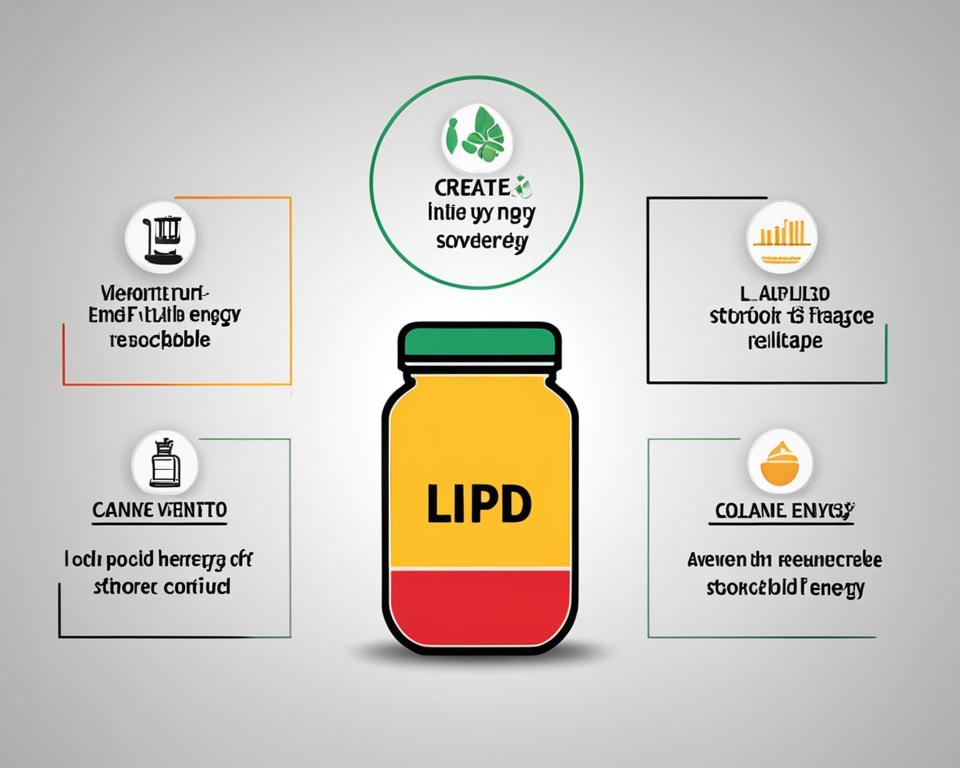
Lipid metabolism is a process by which triglycerides are broken down into their constituent parts, including fatty acids. Fatty acids can be oxidized to generate energy, which fuels various physiological functions, such as breathing and muscle contraction. This stored energy in lipids also helps to sustain our bodies during prolonged fasting or physical exertion.
The role of lipids in energy storage is essential to overall health, and a deficiency of lipids can lead to metabolic disorders and other health problems.
Lipids in Cell Structure
Lipids are essential components in maintaining the structure and function of cells. Phospholipids, a type of lipid, are the primary building blocks of cell membranes. These phospholipids are arranged in a bilayer structure, commonly known as the lipid bilayer. The lipid bilayer acts as a selectively permeable barrier, regulating the movement of substances in and out of the cell.
Furthermore, lipids serve multiple functions in cell signaling. Lipid molecules such as diacylglycerol and inositol phospholipids play important roles in activating various signaling pathways within cells. Lipids are also involved in regulating cell adhesion and cellular interactions.
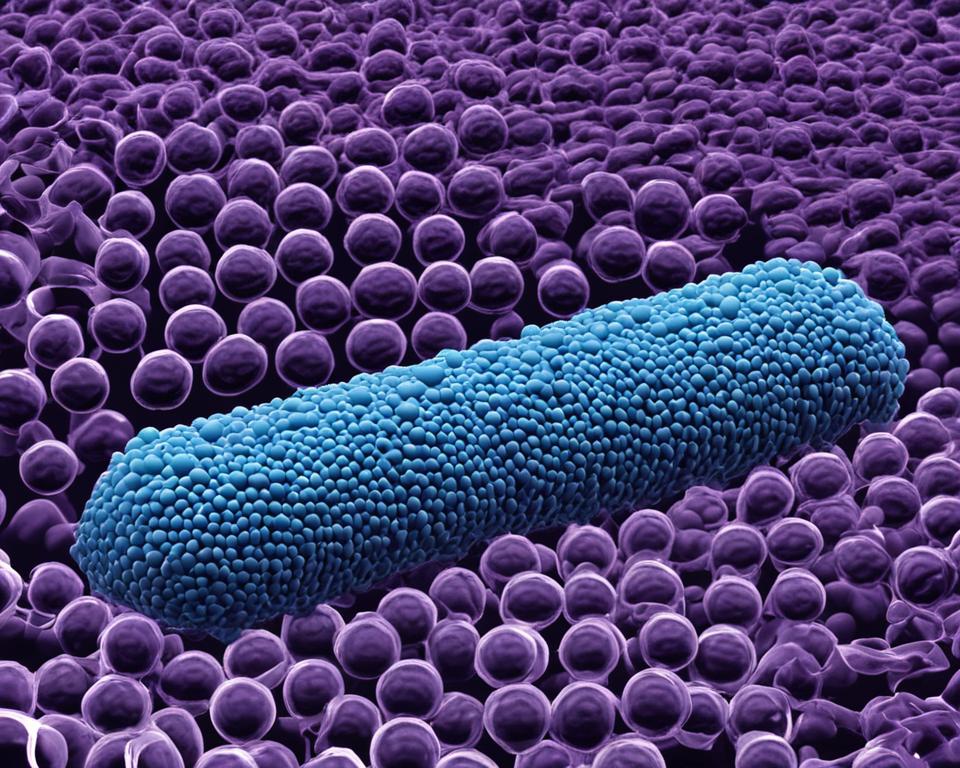
Lipids in Hormone Production
Lipids play an essential role in the synthesis of hormones in the body. Cholesterol, in particular, serves as a precursor for the production of steroidal hormones like cortisol, estrogen, and testosterone. These hormones have vital functions in various physiological processes, including metabolism, reproduction, and response to stress. Without the lipid-derived precursors, the synthesis of steroidal hormones would not be possible.
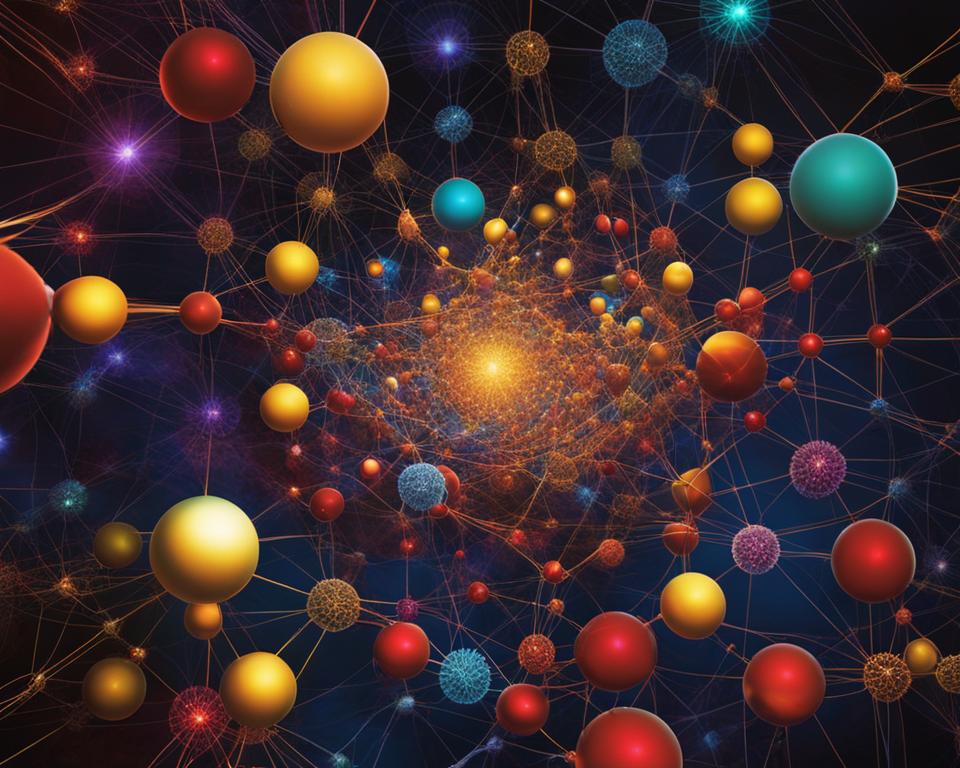
The adrenal and gonads produce most of the steroidal hormones, and the synthesis is tightly regulated by a negative feedback mechanism involving the hypothalamus, pituitary gland, and the target organ. The cholesterol used for hormone synthesis can come from both endogenous and exogenous sources, emphasizing the importance of maintaining healthy lipid metabolism.
Lipids in Brain Function
Lipids are crucial for maintaining optimal brain function. The brain is composed of approximately 60% fat, with lipids playing a significant role in the formation and maintenance of the myelin sheath. This protective covering around nerve cells facilitates efficient signal transmission, allowing for proper neurological function.
Omega-3 fatty acids, a type of lipid, have been found to be particularly beneficial for brain health. These fatty acids help in the formation and maintenance of the myelin sheath, promoting efficient signal transmission between nerve cells. Additionally, studies link omega-3 fatty acid consumption with improved cognitive function and reduced risk of neurodegenerative diseases such as Alzheimer’s and Parkinson’s disease.
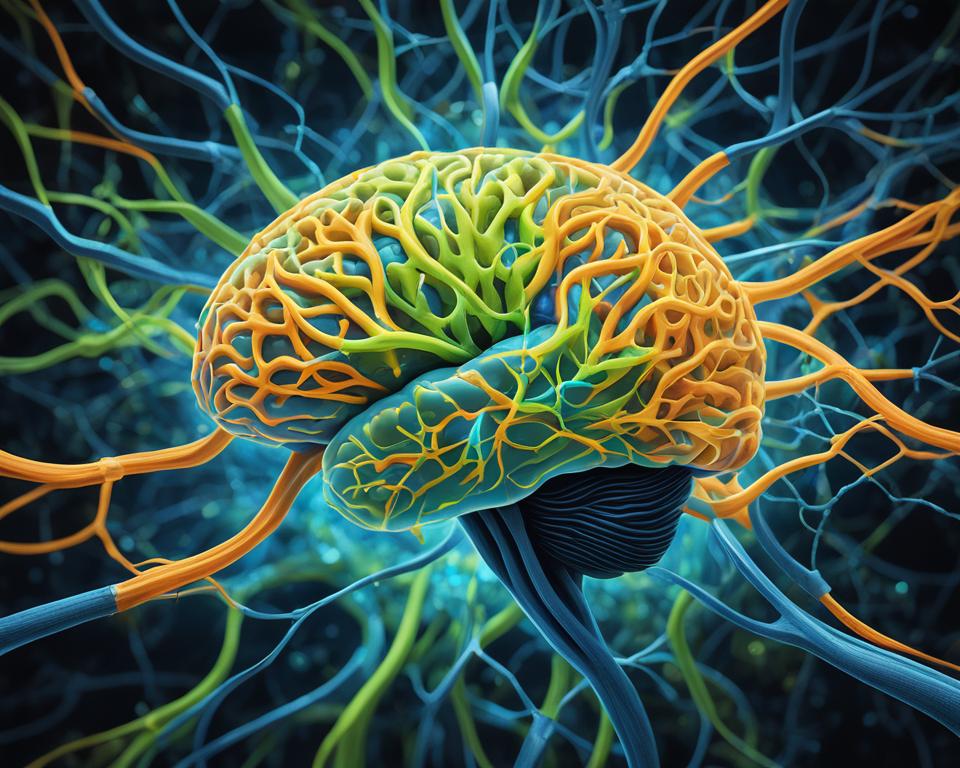
Ensuring adequate consumption of omega-3 fatty acids through diet or supplementation can be an easy way to support brain health and cognitive function.
Lipids in Vitamin Absorption
Certain vitamins, such as vitamins A, D, E, and K, are fat-soluble, which means they require lipids for proper absorption into the body. Without the aid of lipids, the human body would not be able to absorb these essential nutrients efficiently. Therefore, lipids play a crucial role in the digestion, transportation, and absorption of fat-soluble vitamins.
Lipids contribute to the process of lipid digestion, which occurs in the small intestine. The gallbladder releases bile, a mixture of lipids and other substances, into the small intestine. The bile assists in breaking down fat molecules from the food consumed into smaller droplets, a process called emulsification. Enzymes then help in breaking down the fatty acids, which are then absorbed by the intestinal wall into the bloodstream. The absorbed fatty acids then bind to transport proteins, which carry them to the liver and other tissues.
Without sufficient dietary fat or lipid metabolism, the absorption of fat-soluble vitamins may be compromised. Hence, it is vital to consume sources of healthy fats and lipids in one’s diet to support the optimal absorption of these essential vitamins.
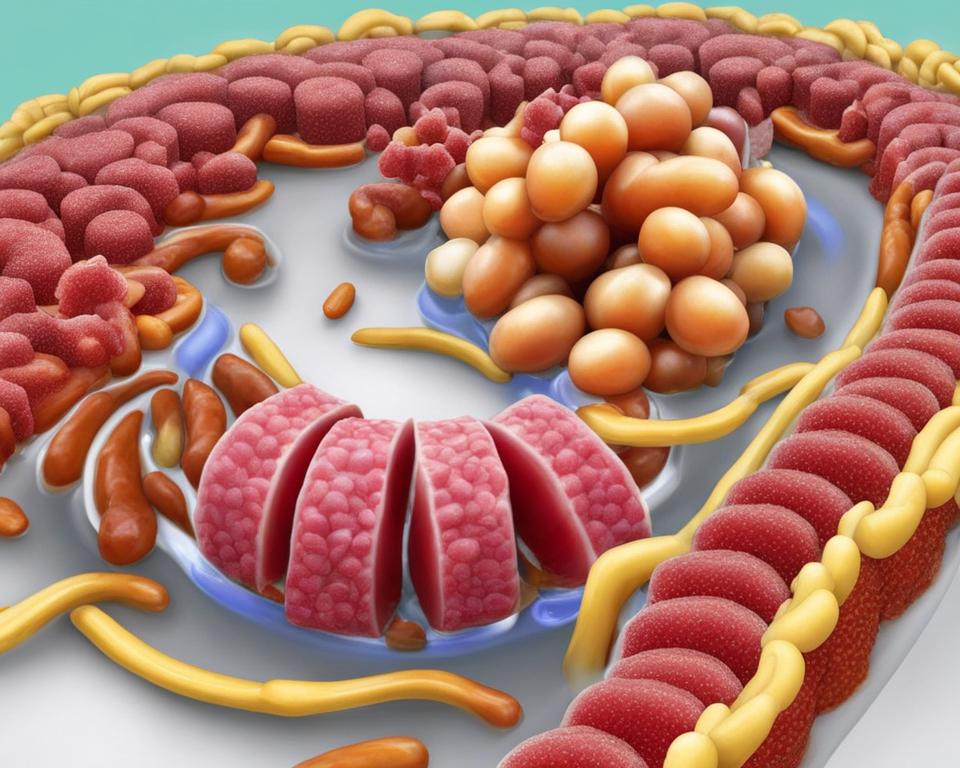
The role of dietary fats and lipids in vitamin absorption
- The digestive system uses lipids to breakdown fat-soluble vitamins and ensure proper absorption.
- Healthy sources of dietary fats include polyunsaturated fats, monounsaturated fats, and saturated fats in moderation.
- It is recommended to consume sources of healthy fats, such as avocados, nuts, seeds, fatty fish, and olive oil, along with a balanced diet to promote optimal vitamin absorption.
Lipids in Skincare and Cosmetics
Lipids have become increasingly popular in skincare and cosmetic products due to their protective and moisturizing properties. The lipid barrier, which is the outermost layer of the skin, plays a crucial role in maintaining skin health. When this barrier is compromised, the skin becomes dry, irritated, and prone to damage.
Lipid moisturizers help restore and maintain the lipid barrier of the skin, preventing moisture loss and promoting hydration. These moisturizers contain a combination of lipids, such as ceramides, glycerides, and fatty acids, that are similar to the lipids naturally present in the skin. By applying a lipid moisturizer regularly, you can improve your skin’s overall health and reduce the risk of dryness, flakiness, and wrinkles.
Furthermore, lipid-derived compounds are used in cosmetics for their emollient and anti-aging effects. These compounds include squalene, which is a natural antioxidant present in human sebum, and phospholipids, which have emulsifying and smoothing properties. These ingredients help enhance the texture and appearance of the skin, making it more supple and youthful-looking.
In conclusion, lipids are essential for maintaining the health of the skin, and their applications in skincare and cosmetic products are numerous. By incorporating lipid moisturizers and lipid-derived compounds into your daily skincare routine, you can improve your skin’s lipid barrier function and achieve a healthier, more radiant complexion.

